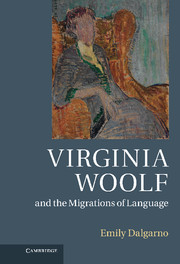Book contents
- Frontmatter
- Contents
- Preface
- Abbreviations
- The migrations of language: introduction
- Chapter 1 Translation and ethnography in “On Not Knowing Greek”
- Chapter 2 Antigone and the public language
- Chapter 3 Tolstoy, Dostoyevsky, and the Russian soul
- Chapter 4 Proust and the fictions of the unconscious
- Chapter 5 Translation and iterability
- Chapter 6 Assia Djebar and the poetics of lamentation
- Conclusion
- Bibliography of works cited
- Index
Conclusion
Published online by Cambridge University Press: 07 October 2011
- Frontmatter
- Contents
- Preface
- Abbreviations
- The migrations of language: introduction
- Chapter 1 Translation and ethnography in “On Not Knowing Greek”
- Chapter 2 Antigone and the public language
- Chapter 3 Tolstoy, Dostoyevsky, and the Russian soul
- Chapter 4 Proust and the fictions of the unconscious
- Chapter 5 Translation and iterability
- Chapter 6 Assia Djebar and the poetics of lamentation
- Conclusion
- Bibliography of works cited
- Index
Summary
Throughout this study I have been concerned with the effects on Woolf’s writing practice of those translations from Greek, Russian, and French by means of which she created the historical moment when feminist history might challenge the assumptions of the dominant culture. Her response to translation reveals the importance of language in her methods as a historian, in a narrative that is marked by her position as an imperial subject. Woolf first studied foreign languages within the institutions of the British educational system, whose ideals are reflected in the essays of Matthew Arnold. His position is the referent of her theories of “knowing” Greek and of translation as focused largely on semantics. Her major translation essay, “On Not Knowing Greek,” was written when, after completing her university courses, she undertook, with Janet Case, an education in Greek philosophy and tragedy that was the backbone of her writing career. In her early translation of the ancient Greeks she worked in the shadow of Arnold, the effects of whose ideas persisted throughout her life. Although she resisted his attempts to maintain the dominant paradigm, some of her lifelong habits suggest that she continued to work within the limits that Arnold imposed on the translator, in particular his attention to the translation of individual words. His preoccupation with semantics assumes that to establish equivalence between the vocabularies of two languages is the central task of the translator. Woolf’s tendency to focus on the translation of love or soul, for instance, maintains links not only with Arnold’s methods but with her own marginal retranslation of individual words in Agamemnon as well.
Yet a theory of translation that is now considered outmoded led Woolf into new territory, as though a single word might open onto another world. She wrote in 1938 that reading “translations of Greek verse . . . is like an aeroplane propeller invisibly quick and unconscious” (D5: 131). The startling image suggests the immediacy of her surrender to a Greek text, as well as its centrifugal effect on her mind. For instance the continuing effect of Shelley’s translation of the Symposium, in particular the untranslated word for love between men, is apparent in the many ways that she too sought to bring into the public domain a discourse in which language might name same-sex love. Translations from other languages had a similar effect. In the work of Dostoyevsky and Proust she discovered an attention to soul that was missing in the work of the British novelists of her generation. Her diary as well as her fiction reveals that soul, a key word in their fiction that was never adequately translated, kept open a window onto the unknown and untranslatable that was the lodestar of her spiritual search for what eludes representation. The extraordinary significance of key words in her novels – light in Jacob’s Room, plunge in Mrs. Dalloway, or flounder in To the Lighthouse – suggests the capacity of the single word to organize narrative.
- Type
- Chapter
- Information
- Virginia Woolf and the Migrations of Language , pp. 189 - 195Publisher: Cambridge University PressPrint publication year: 2011

